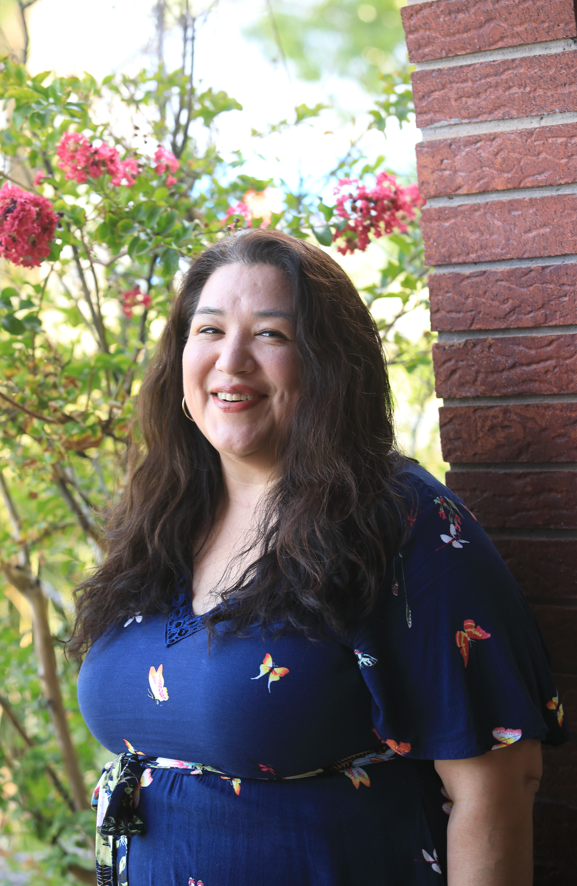for Webflow

Dr. Luz Angélica Maldonado Rodríguez is a Tejana from la frontera of El Paso, Texas. Daughter of a bilingual teacher and an electrician, with raíces from Chihuahua and Guanajuato, México, an emphasis on education, hard work, and service was an integral part of her upbringing. As the eldest of 6 siblings, a love of teaching was fostered from a young age, as she often held escuelita for her younger brothers long before becoming a mathematics teacher educator. Due to an early focus on STEM through tracking in her middle school and high school education, Luz majored in Mechanical Engineering at Rice University. A critical part of her undergraduate experience included volunteering at local Houston high schools as a member of the university’s chapter of the Society of Hispanic Professional Engineers (SHPE). These experiences cemented a desire to work in a classroom and upon graduation, she became a 1st grade bilingual teacher in East Houston. Although her students considered themselves matemáticos y cientificos, Luz felt a need to further her education to better understand how children learn mathematics. While completing her master’s degree in Mathematics Education with an emphasis in Bilingual/Bicultural Education at Teachers College, Columbia University, she had the opportunity to participate in emerging research on dual language education in New York City public schools. By this point, Luz had started understanding the key role that classroom teachers play in the development of the mathematical identity of their students. She returned to Texas to continue her learning and research at the University of Texas at Austin, completing a PhD in Mathematics Education, with a doctoral portfolio in Mexican American Studies. She is currently an associate professor of Bilingual Mathematics Education at Texas State University in San Marcos, Texas, in the department of Curriculum and Instruction.
Luz’s scholarship intersects the fields of mathematics and bilingual education and addresses the critical need to examine and highlight the mathematical brilliance of emergent bilingual students. Due to her teaching experiences in Houston and New York City, she entered academia with the desire to impact children’s agency in the elementary mathematics classroom. Her published works counter deficit narratives imposed on historically underrepresented students to showcase cognitive, cultural and linguistic conceptual knowledge that already exists in children, their families and communities. Her publications have explored the connections to translanguaging and mathematics teaching and learning, while revealing the raciolinguistic ideologies that continue to permeate mathematics education. An important aspect of her work is building relationships with pre-service and in-service teachers, particularly in documenting empowering teaching and learning practices. Luz’s research with bilingual teachers and their students, along with mathematics professional development for elementary teachers in multiple states, constantly informs her undergraduate and graduate level teaching and compels her to understand how to better prepare elementary teachers for their future mathematics classrooms. As an elementary teacher educator for over 18 years, she implements and expands upon notions of equity, language, power, and identity in the math methods and bilingual education courses that she teaches. An important goal connecting research and teaching is to understand how to cultivate a critical understanding of mathematics teaching and learning in our pre-service teachers of color. While a focus on children’s mathematical thinking in a math methods course is a starting point to change traditional elementary mathematics teaching, it is vital to also prepare pre-service teachers to recognize and challenge systemic inequities embedded in education and the mathematics classroom. Luz is a co-PI in a cross-site NSF Racial Equity in STEM grant titled “Identifying Systemic Racism in Mathematics Teacher Education: Building a Cross-Site Community with Preservice Teachers of Color”. This cross-site investigation between an HSI, HBCU and PWI has an intentional focus on the experiences of preservice teachers of color, whose own racialized mathematics learning experiences have mostly remained unexamined.
Whether it is mentoring other historically underrepresented scholars, as faculty sponsor of the Bilingual Education Student Organization (BESO), or serving on various departmental, college or university wide committees, Luz finds service is an integral part of being in community with others. Luz was able to be part of a university wide committee that lead to the creation of a Latino/a Studies Minor at Texas State and serves on its Advisory Board. Given how critical it was to Luz’s success throughout her university schooling experience to be able to find others who shared similar cultural and educational journeys, being able to help foster this kind of experience for Texas State students has been very fulfilling. Luz has also served on the Board of TODOS: Mathematics for All, a national organization dedicated to advocate for equity and high-quality mathematics education for all students, in particular Latina/o students. She currently serves as the chair of the Professional Development committee and helps to share resources on teaching critical mathematics in K-12 classrooms.
“Early in my career, I interviewed a 6th grader on her mathematical modeling strategies and mathematics learning experiences as a bilingual student. She lamented that 4th grade was when they ‘took my language away’ as she was transferred from a bilingual to monolingual classroom. I remember her story often, and that although Hispanic Heritage Month was made official in the 1980s, too many Latine students are still not allowed to bring all of who they are to school. This month provides an opportunity to highlight Latines who are successful in thriving in spaces that were not always made for us.”